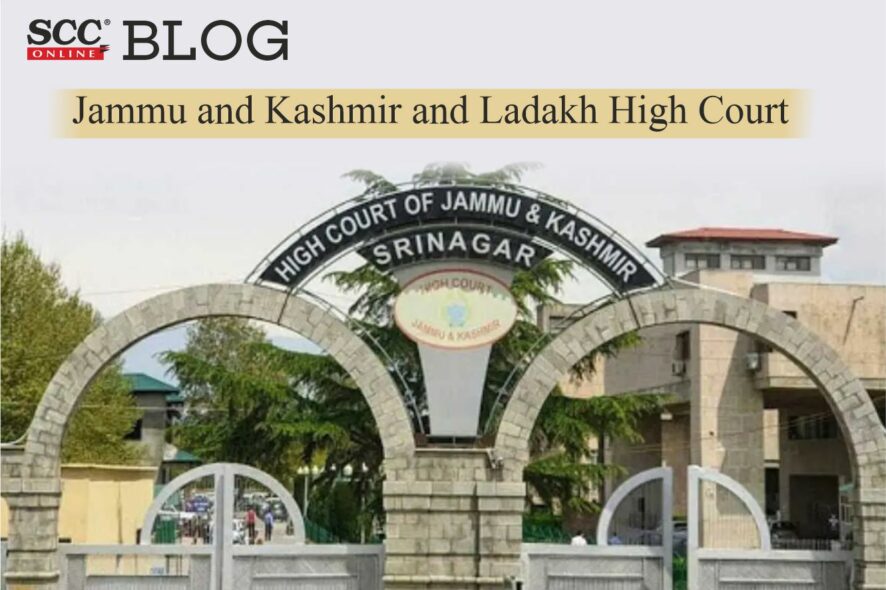“Higher the forum and greater the powers, the greater is the need for restraint”
Jammu and Kashmir and Ladakh High Court: While allowing the instant petition wherein the aggrieved party invoked the jurisdiction of the Court under Section 482 CrPC, seeking to expunge the adverse remarks, observations and directions made by the Additional Sessions Judge, Jammu; the bench of Mohan Lal, J., observed that for proper administration of justices, judges must remember the general principle of highest importance that, derogatory remarks are not to be made against persons, unless such censuring of conduct is absolutely necessary for the case. “The Judge’s Bench is a seat of power and has absolute and unchallengeable control of the court domain, but they cannot misuse their authority by intemperate comments, undignified banter or scathing criticism of counsel, parties or witnesses”.
Facts of the case: The petitioner who is the Dy. Superintendent of Police (HQ), Kishtwar, was handling investigation in several cases filed under the Unlawful Activities Prevention Act and Arms Act. Upon completion of investigation in one of the cases [FIR No. 01/2020], the matter was presented before the Trial Court. In the impugned order dated 02-06-2021, the Additional Sessions Judge, after framing the charges, went on to make certain observations regarding the conduct of investigation into the matter with particular focus on the petitioner. The Judge noted that, “during investigation I/O/petitioner has conducted the investigation in a lethargic and sluggish manner (…) much better investigation could be conducted by even a Head Constable in comparison to I/O (…) I am quite surprised that how Mr. Sunny Gupta, Dy. SP has qualified the administrative examination of the state and become Dy. SP in the police department”.
Aggrieved by the afore-stated remarks, the petitioner knocked on the doors of the High Court.
Contentions:
- The counsel for the petitioner submitted that the disparaging remarks made by the Trial Court against the petitioner have the potential to demoralize the police officers, who by putting their lives to grave risks, are bursting the militants/terrorists’ network and are investigating the cases under Unlawful Activities Prevention Act.
- It was argued that though it is right of the courts to make free and fearless comments and observations, but there is corresponding need for maintaining sobriety, moderation and restraint regarding the character, conduct, integrity, credibility etc. of parties or witnesses or others concerned. The Judges and Magistrates must be guided by considerations of justice, fair play and restraint.
- The petitioner also submitted that, the remarks of the Trial Court regarding the petitioner’s eligibility and professional competency were harsh/disparaging which should not have been made by the Trial Court which was only dealing with a question of charge/discharge of the accused.
Per- contra, the respondents argued that
- Petitioner had failed to investigate the case in a manner required under law against the accused persons, therefore, the Trial Court correctly recorded that investigation has been conducted in a very perfunctory and unprofessional manner, whereby, IGP Jammu has been directed by the trial court to conduct departmental enquiry against the petitioner,
- It was contended that the impugned order is in accordance with law and does not suffer from any illegality.
Observations: Perusing the facts, contentions and the disputed remarks, the Court referred to the cases of Niranjan Patnaik v. Sashibhusan Kar, (1986) 2 SCC 569 and Abani Kanta Ray v. State of Orissa, 1995 Supp (4) SCC 169, whereby it was made very clear that, “In expressing their opinions, Judges and Magistrates must be guided by consideration of justice, fair play and restraint, (…) the judges should not normally depart from sobriety, moderation and reserve and harsh or disparaging remarks are not to be made against the parties or authorities unless it is really necessary for the decision of the case as integral part thereof”
- The Court observed that petitioner as I/O of the case, in his best wisdom, has collected all the material/evidence during the investigation conducted by him and has placed all the relevant evidence before the Trial Court. Therefore, it was the duty of the Trial Court evaluate the presented evidence on the record and to prima-facie come to conclusion whether accused persons can be charged/discharged.
- The Court pointed out that it was not necessary for the Trial Court to record such harsh/disparaging remarks against the petitioner. “Law is no longer res-integra that the harsh or disparaging remarks are not to be made against the persons and authorities whose conduct comes into consideration before the courts unless heard”.
- The Court stated that Judicial restraint and discipline are necessary to the orderly administration of justice. “The duty of restraint is humility of function and should be a constant theme of our Judges”.
Decision: Directing that the derogatory remarks made by the Additional Sessions Judge against the petitioner be expunged, the Court held that the Trial Court was supposed to pass/record an order on the charge/discharge of the accused persons, and it was not absolutely necessary for the Sessions Judge to pass any remark regarding the conduct of the petitioner vis-a-vis the conduct of investigation and discharge of the accused.
[Sunny Gupta v. Union Territory of J&K, 2022 SCC OnLine J&K 520, decided on 04-07-2022]
Advocates appearing in the case :
Sunil Sethi, Sr. Advocate with Lawanya Sharma, Advocates, for the Petitioner;
Suneel Malhotra, GA, Advocate, for the Respondents.
*Sucheta Sarkar, Editorial Assistant has prepared this brief.






